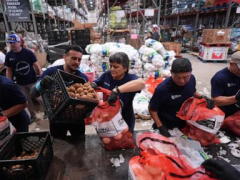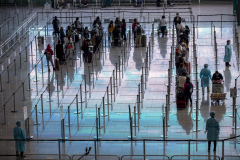NEW YORK — It started with a late October meeting between a lifestyle entrepreneur, a marketing professional, a restaurant owner and a social worker at a brewery in the Florida panhandle. Within hours, Pensacola Grocery Buddies was born.
The four women wanted to pair people facing uncertainty over SNAP food benefits with charitably inclined folks offering to cover grocery costs and deliveries. In just two weeks, co-organizer Hale Morrissette said they’ve made over 300 matches and raised more than $10,000 for those they cannot connect.
“Everybody’s stepping up,” said Morrissette, 35, the operations director at a local health nonprofit called ROOTS. “They know that this is not something that’s like a partisan type of issue. It’s about service and it’s about taking care of each other.”
Everyday people have improvised such stopgap efforts to support their communities through a historically long government shutdown that has deepened disruptions to federal services. Whether feeding hungry families or maintaining local museum tours, volunteers nationwide are strengthening social ties that they hope will continue making their neighbors whole in the face of persistent precarity.
At the Oklahoma City National Memorial, volunteers have filled in giving the grounds tours typically led by now-furloughed National Park Service rangers. The site honors the 168 people killed 30 years ago when a truck bomb detonated outside a federal building, the deadliest homegrown attack on U.S. soil.
Pat Hall, a 74-year-old state lobbyist and memorial trustee whose wife was there the day of the explosion, said he was “honored to step up” and “keep the flame alive.” His first tour group was a senior class that had travelled three hours by bus from their rural high school.
Hall said he wanted to ensure that the government shutdown didn’t stop visitors from learning “the Oklahoma standard,” a term borne from the 1995 attack to promote a culture of caring throughout the state.
“The rest of our life was to give, not take,” Hall said he realized in the attack’s aftermath. “My wife survived a bombing. I have to give back.”
“We have to lift each other up,” said fellow trustee Sara Sweet. “There’s many, many, many opportunities. Because the need is so great. No matter what sector or what aspect of our communities we’re looking at.”
Many have taken up that ethos — that the vast amount of need demands greater levels of service — after a yearslong backslide in the number of people who donate their time to nonprofits.
Anna Culbertson was compelled earlier this year by her own job loss. The former National Institute of Allergy and Infection Diseases program specialist was among the thousands laid off this spring at the nation’s top health agencies. She then co-founded 27 UNIHTED, a National Institutes of Health alumni network providing pee





